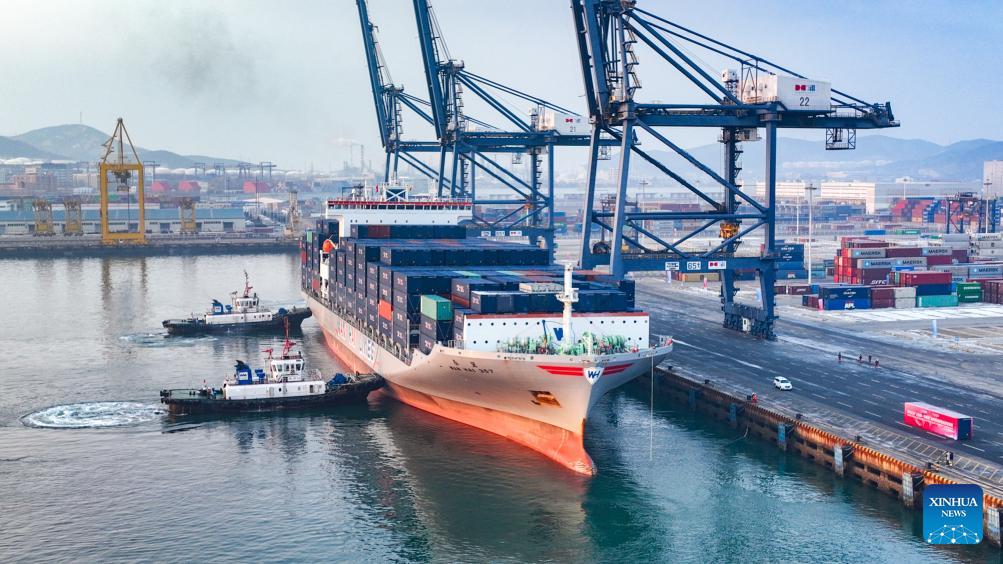
 0 Comment(s)
0 Comment(s) Print
Print E-mail China Daily, February 6, 2024
E-mail China Daily, February 6, 2024

A container ship berths at the Dalian port in northeast China's Liaoning province on Jan. 2, 2024. [Photo/Xinhua]
Liaoning Port Group's Dalian Container Terminal Co, which is located in Jinpu New Area of Dalian, Liaoning province, has enhanced efficiency with its integration of 5G-enabled unmanned container trucks, automated rail-mounted gantry cranes and remote-controlled quay cranes.
"The screen provides a clear panoramic view. By operating the joysticks in the office, I can complete the task now," said Qin Xuhai, 48, a quay crane operator in the terminal who now remotely maneuvers containers from ships onto smart container trucks.
Qin had 17 years of experience as a quay crane operator before he became a remote operator in June 2022. He recalled the challenges of traditional on-site operations, including physical strain and uncomfortable working conditions within the crane cabin at about 40 meters high.
A few hundred meters away from the office building, in the automated operations area, six unmanned container trucks are in use beneath a quay crane.
Once loaded, the trucks navigate through the yard, delivering the containers to automated rail-mounted gantry cranes before returning to the quay for their next task.
These unmanned trucks rely on"5G+Beidou" technology, enabling real-time reception and execution of transport instructions, including autonomous driving, automatic positioning and overtaking operations.
Wang Chong, deputy manager of operations and management at the container terminal, stated that all unmanned trucks at the terminal are electrically powered, allowing for seven to eight hours of continuous operation after a one-hour charge, making them more energy-efficient compared to conventional internal combustion engine-driven transport methods.
The terminal is utilizing 15 5G-enabled unmanned container trucks now.
"Under the traditional manned truck operation mode, each operating line required six drivers, necessitating shift rotations. With unmanned trucks, automated operations can meet the 24-hour production demand, requiring only one staff member to monitor each operating line remotely," Wang said.
As for the 24 rail-mounted gantry cranes, they needed 16 personnel. Now, only five are required, and during personnel shortages, such as during the pandemic, as few as three were needed, he said.
"The system's intelligent algorithms ensure that the containers arriving at the port are automatically allocated to the optimal position in the yard, reducing waiting times under the same crane and thereby enhancing operational efficiency," Wang said.
According to data, after the system's online operation, the comprehensive efficiency of single quay crane operations increased by 5 percent, vessel operations efficiency increased by 10 percent, and the time for external trailers in the port was reduced by nearly 20 percent.
Zhang Hao, deputy general manager of Dalian Container Terminal Co, said that out of the terminal's eight quay cranes, two have completed transformation to automated operations. Plans are afoot to have all the eight cranes fully automated by 2025.
The Liaoning Port Group's "Dayaowan Smart Port 2.0"project has achieved intelligent and green upgrades on top of automation. For instance, the terminal has established three indoor and one outdoor environmental monitoring points, integrating comprehensive data on five major environmental elements involving port water, electricity, air, weather and tides.
"Smart factories are still a bit distant, but 5G is close to us. Ultimately, we aim to achieve industrial IoT and smart factories," said Bo Hongguang, a professor at the Institute of Operation and Logistics, which is part of the Dalian University of Technology.
When intelligent terminals used by equipment and production lines are easily connected to the 5G network, it lays the most important foundation for subsequent industrial big data collection and further application, he said.
In the 2023 list of 5G-connected factories released by the Ministry of Industry and Information Technology, Dalian Container Terminal's 5G Smart Port was included as one of the 300 factories that were selected from submissions across the country.
The guidelines for the construction of 5G fully connected factories issued by the ministry in August 2022 proposed that during the 14th Five-Year Plan (2021-25), the focus will be on various industries like raw materials, equipment, consumer goods and electronics as well as key industry sectors like mining, ports and power, promoting the construction of fully connected 5G factories and driving the deep development of 5G integrated applications.
China's automated container terminals, both those already built and others under construction, rank first in the world, according to a news conference held by the State Council Information Office on Dec 21.
Currently, 18 automated container terminals have been completed, with an additional 27 under construction, including renovated automated container terminals, said Yang Huaxiong, deputy director of the Water Transport Bureau of the Ministry of Transport.